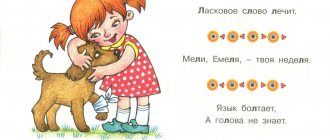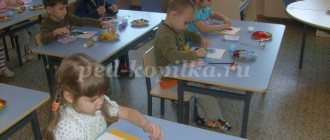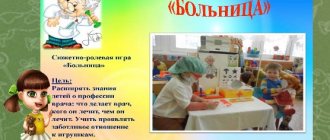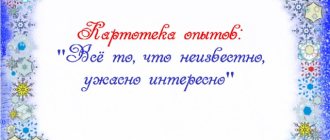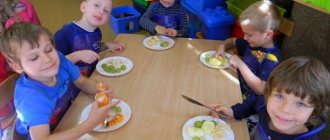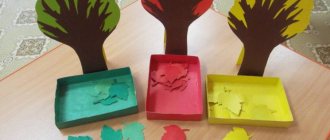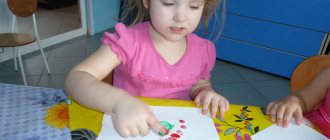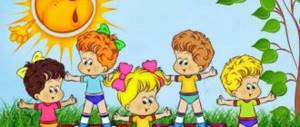Entertainment based on the fairy tales of K.I. Chukovsky (senior preschool age)
- April 14, 2017
International and All-Russian competitions
All-Russian conference “Organization of the educational process in preschool educational institutions in the context of the implementation of the Federal State Educational Standard for Preschool Education”
GOAL: To cultivate in children an interest in the works of K. Chukovsky, a desire to learn new fairy tales; a friendly attitude towards each other, a sense of empathy, a desire to help others; to cultivate faith in goodness, friendship and love, in triumph over evil.
MATERIAL: portrait of K.I. Chukovsky, children's drawings based on the works of K.I. Chukovsky, his books, illustrations for works, a box with lost things, cut-out pictures (towel, faucet, washcloth, jug, soap), “The Magic Book of Fairy Tales” , audio recordings: “The bears were riding a bicycle” from the fairy tale “The Cockroach” by muses. I. Tsvetkov, words by K. I. Chukovsky,
PRELIMINARY WORK: reading fairy tales by K. I. Chukovsky “Moidodyr”, “Doctor Aibolit”, “Fly-Tsokotukha”, “Fedorino’s grief”, “Confusion”; productive activity: drawing on the theme: “Heroes of K. Chukovsky’s fairy tales”, modeling on the theme: “Fedorina’s dishes”, applique on the theme: “The multi-colored dress of Mukha-Tsokotukha.”
Progress of the lesson
To the audio recording “The bears were riding a bicycle” from the fairy tale “The Cockroach” by muses. I. Tsvetkova, words by K.I. Chukovsky, children enter the elegantly decorated hall and sit on chairs.
HOST: Not far from Moscow, in the village of Peredelkino, in a small house lived for many years a tall, gray-haired man, whom all the children in the country knew. Scientist, writer, translator, literary critic, K. Chukovsky wrote many poems and fairy tales for children.
Chukovsky is a pseudonym. The real name of the writer is Nikolai Vasilyevich Korneychukov. Chukovsky became a children's poet and storyteller by accident. And it turned out like this.
His little son fell ill. Korney Ivanovich carried him on the night train. The boy was capricious, moaning, crying. In order to somehow entertain him, his father began to tell him a fairy tale: “Once upon a time there was a crocodile, he walked the streets.” The boy suddenly became quiet and began to listen. The next morning, when he woke up, he asked his father to tell him yesterday’s tale. It turned out that he remembered it all, word for word.
I invite you to go to a magical fairyland, where the good fairy tales of Korney Ivanovich Chukovsky live. Do you agree? (Children's answers).
HOST: Close your eyes. We will go to a fairyland.
Grandfather Korney invites all the children to visit. But he is especially happy to invite such guys. Who knows how to listen to fairy tales or loves to read them.
Just like at our gate, a miracle tree grows, not flowers, not leaves on it, but fairy tales by K.I. Chukovsky (the tree is decorated with fairy tales).
HOST: Guys, look how many fairy tales have grown on the tree. Do you know all the fairy tales of Grandfather Korney? We'll check it now.
HOST: Books are requested:
And now you, friends, get to know us. Think together guys, we need to remember these fairy tales!
1. The bears were riding a bicycle. And behind them is a cat backwards. And behind him are mosquitoes in a balloon. And behind them are crayfish on a lame dog. Wolves on a mare. Lions in a car. Bunnies on a tram. Toad on a broom... They ride and laugh, chew gingerbread. Suddenly, from the gateway, a terrible giant, Red-haired and mustachioed Ta-ra-kan! ("Cockroach")
2. Suddenly, a bowlegged and lame man runs out of my mother’s bedroom and shakes his head. (“Moidodyr”)
3. The fly walked across the field, the fly found the money. A fly went to the market and bought a samovar. ("Fly Tsokotukha")
4. Suddenly, from somewhere, a jackal galloped up on a mare: Here is a telegram for you From a hippopotamus!: “Come doctor to Africa as soon as possible And save our babies, doctor” (“Doctor Aibolit”)
5. The cockroaches came running and drank all the glasses. And the bugs are three cups each, with milk and a pretzel. ("Fly Tsokotukha")
6. And the foxes took matches, went to the blue sea, lit the blue sea. The sea is burning with flames, A whale ran out of the sea... (“Confusion”)
7. And in the Big River the Crocodile lies, And in his teeth there is no fire burning, - The sun is red, The sun is stolen. ("Stolen Sun")
8. And behind them Grandma Fedora gallops along the fence: “Oh-oh-oh! Oh oh oh! Come home!”
But the trough answered: “I’m angry with Fedora!” And the poker said: “I am not Fedora’s servant!” (“Fedorino’s grief”)
9. My phone rang. - Who's talking? - Elephant. - Where? - From a camel. ("Telephone")
10. Small children! Don't go to Africa for anything in the world, Go for a walk in Africa!
In Africa there are sharks, In Africa there are gorillas, In Africa there are big Angry crocodiles.
They will bite you, beat you and offend you, - Don’t go, children, to Africa for a walk. ("Barmaley")
Presenter: Well done, you know a lot of fairy tales. Why do you guys like these fairy tales?
Children's answers: Because they are kind, funny, interesting, instructive.
Presenter: What do fairy tales teach us?
Children: Be kind, neat, polite.
GAME Competition.
On the table there are objects from various fairy tales by K.I. Chukovsky. Children are divided into 4 teams. Each team must select those things that only fit their fairy tale.
1st team - fairy tale “Moidodyr” (soap, toothpaste, toothbrush, towel, comb).
2nd team - fairy tale “Fedorino’s grief” (plate, saucer, pan, spoon, fork).
HOST: Wherever Chukovsky was: on the tram, in line, at the doctor’s, he did not waste time, but composed riddles for children. Listen and guess.
I had a cart, but there was no horse, and suddenly it neighed, neighed, and ran. Look, the Cart ran without a horse. (Car)
It was a cheerful house, a wonderful house. And something knocked inside him. And it crashed, and a living miracle jumped out from there. So warm, so Fluffy and golden. (Chick)
A steam locomotive without wheels, that's a miracle locomotive! Has he gone crazy and gone straight across the sea? (Steamboat)
I’m lying under your feet, trample me with your boots, and in the morning take me into the yard and beat me, beat me. So that the children can roll on me, flounder and somersault on me. (Carpet)
Here are the needles and pins crawling out from under the bench. They look at me, they want milk. Children: Hedgehog!
Host: Chukovsky has a poem about hedgehogs.
Poem "Hedgehogs Laugh"
By the ditch Two boogers Sell pins to hedgehogs. You can't help but laugh! Everyone can’t stop: “Oh, you stupid boogers! We don’t need pins: We ourselves are stuck with pins.”
Game "Collect needles for hedgehogs."
Equipment: Two drawings of a hedgehog, 2 markers.
How to play: Teams need to draw needles for the hedgehog. Whose team will complete the task faster?
Presenter: Now the children of the older group will tell us an excerpt from the fairy tale “The Fly Tsokotukha.”
Presenter: Guys, what characters do these fairy-tale names belong to?
Game "Who's Who".
- Aibolit - (doctor)
- Barmaley - (robber)
- Fedora - (grandmother)
- Karakula - (shark)
- Moydodyr - (washbasin)
- Totoshka, Kokoshka - (crocodiles)
- Tsokotuha - (fly)
- Red-haired, mustachioed giant - (cockroach)
GAME "Black box".
In the box is the favorite treat of crocodiles from the fairy tale “Telephone”.
- What is this? (Galosh) In the box is what the crocodile swallowed in the fairy tale “Moidodyr”. - What is this? (Washcloth) In the box is what the butterfly was treated to in the fairy tale “The Cluttering Fly.” - What is this? (Jam) In the box is what the doctor used to treat hippos in the fairy tale “Doctor Aibolit.” - What is this? (Chocolate) In the box is what the mosquitoes rode in the fairy tale “The Cockroach.” - What is this? (Ball)
Presenter: Now the children of the older group will show you the fairy tale “Telephone”.
Presenter: Our journey into the fairy tales of Grandfather Korney has come to an end. Did you like it? To commemorate your fabulous journey, the Miracle Tree gives you gifts. Now we close our eyes and return to kindergarten.
Speech games based on the fairy tales of K. Chukovsky. card file on speech development (middle group) on the topic
Let's play Chukovsky's fairy tales. Korney Ivanovich Chukovsky is rightfully considered one of the favorite children's writers. More than one generation of children has been brought up on Chukovsky's fairy tales. Expressive, bright, dynamic, they fascinate the child, because Chukovsky in his fairy tales plays with children, and for little listeners, reading these fairy tales turns into a fun game. Children enjoy reciting Chukovsky's poems, which contributes to their speech development. We decided to promote children's speech development through games based on Chukovsky's fairy tales. Here's how we play: Speech games that help enrich the vocabulary and form the grammatical structure of speech. 1. “Get to know the hero” Objectives: • find the hero by definition words; • independently come up with and select definition words to describe the characters: Ugly, bad, greedy - Barmaley. Kind, attentive, caring - Aibolit. Menacing, toothy, unscrupulous - Crocodile. Small, thick-footed, clumsy - bear cubs. Small, fearless, brave - a mosquito. Bow-legged, lame, good - Moidodyr. Bloodthirsty, merciless, evil - Barmaley. 2. “Everything is the other way around” Goal: to be able to select words with opposite meanings for definition words Sick - healthy (animals) Angry - kind (Barmaley) Sad - Cheerful (Fedora) Dirty - clean (boy) Dark - light (stolen sun) Tall – low (giraffe, hippo) 3. “What is he doing?” Goal: to match the objects and characters of fairy tales with action words Pillow - galloped away Sheet - flew away Trousers - ran away Table - left Washbasin - ran out Fly - went to the market, etc. 4. “Who? What?" Goal: to be able to distinguish between living and nonliving things by correctly asking questions; who what?. Fly-Tsokotukha - Aibolit samovar - Fedora's thermometer - Crocodile dishes - sun, etc. 5. “The fourth odd one” Purpose: to determine which of the named objects is odd. Explain your choice. Aibolit, wolves, ship, eagle Samovar, Tsokotukha fly, grass snake, mosquito Iron, rolling pin, saucers, tape recorder 6. “Tongue Twisters” Purpose: to learn to clearly pronounce the text, gradually increasing the pace. Centipedes have too many legs. Tell me about your shopping. What kind of shopping? About shopping, about shopping About your shopping. 7. “Riddles” Purpose: to teach children to guess riddles based on the content of the fairy tale text. 8. “Little words” Goal: to use prepositions correctly in speech, to know their meaning. - And Aibolit fell and lies in the snow. - He is in Africa, he is sitting in Africa under a palm tree. - And nearby the hippos grabbed their tummies. - I'll sew him new legs. He'll run along the path again. 9. “One-many” Purpose: to practice the ability to put words into the plural form of the genitive case One tree - many... One palm tree - many... One crocodile - many... One monkey - many... One little animal - many... One insect - many...Games for the development of coherent speech.
Goals:
Purposefully develop dialogical speech. To develop in children the ability to answer and ask questions, to participate in a collective conversation. Learn to formulate your thoughts in the form of complete sentences, and compose a short story from them. 1. “Don't cry, little mouse” In this game, an adult takes on the role of a mouse who is left alone. He grieves and cries, and various heroes of Chukovsky’s fairy tales try to entertain him with conversation. The teacher, playing the role of a mouse, laments: “Poor me, poor me.” Who will talk to me, who will wipe away my tears. Child: I'll talk to you, I'll wipe your tears. - And who are you? Child: I am a clattering fly, etc. At the mouse’s request, children sing songs, read poems, show books, invite them to play, etc. 2. “Lost and Found” (the game is demonstrated) Teacher-presenter: – The lost and found office is working. Lost and found items in the lost property office. You can pick them up only when you tell a line from the work of K.I. Chukovsky with this word 3. “Help!” (game on display)
Woe! Woe! The crocodile swallowed the sun in the sky
The teacher takes on the role of a crocodile (in his hands is a toy with the sun in his mouth). Hey, you animals, come out and defeat the crocodile, so that the greedy crocodile will turn the sun into the sky. But the furry ones are afraid: Where can we fight this kind of thing? He is both menacing and toothy. He will not give us the sun! Let's stop the fairy tale! Who will help us? Let's call on heroes from other fairy tales by K. Chukovsky, well, at least from the fairy tale “The Tsokotuha Fly” (children take on the role of the Tsokotuha Fly, a spider, a beautiful butterfly, etc.) and try to persuade the crocodile to return the sun. Or maybe the heroes of the fairy tale “Telephone” will come and call the crocodile. 4. “Guests” Heroes of fairy tales go to visit each other. A clattering fly to Grandma Fedora. She talks about her story, listens to Fedora, gives advice, helps. Moidodyr to Fedora. Teaches Fedora to be clean. Teaches how to wash dishes, etc. A boy to his grandmother Fedora. Barmaley to Aibolit, etc. 5. “An Unexpected Meeting” Moidodyr – Tskokotuha Fly Aibolit – Spider (common) 6. “Dunno Dunno has never read Chukovsky’s fairy tales - the children introduce him to the heroes of fairy tales from photographs (pictures). Moidodyr is a washbasin who got angry with a dirty boy. A clattering fly is a birthday girl who invited bugs and cockroaches to her place for tea and serious trouble happened to her. Komarik is... Barmaley is... Cockroach is... Fedora is...
7. “Explainers” Continue the sentences. The mosquito is brave, because... Tanya and Vanya are naughty, because... The sea went out, because... Moidodyr got angry, because... The dishes ran away from Fedora, because... 8. “Confusion” Look at the pictures. What did the artist get wrong? A giraffe is pulled from the swamp. A clattering fly in Aibolit's cap. Stolen sun in the teeth of a wolf, etc. 9. “Letter” (we write a letter to the hero) Example: “Hello, Aibolit! Alena Ivanova is writing to you. When I listen to Aibolit’s story about you, I am always very worried. It was difficult for you to get to Africa. And I feel sorry for the animals that got sick. And then I rejoice, because you, Aibolit, cured everyone with your eggnog. I'd like to try it too. Probably a tasty medicine. Your job is very difficult, Aibolit, you are probably very tired. I invite you to visit me, come and relax - we’ll go to the forest and go fishing. Goodbye Aibolit, I'm waiting for you to visit. Alyona." 10. “Meeting of Crocodiles” (the game is demonstrated) A gallery of portraits of crocodiles from various fairy tales is exhibited: “Moidodyr”, “Stolen Sun”, “Barmaley”, “Cockroach”, “Confusion”, “Telephone”. Children identify the hero: from which fairy tale, give a description, determine where the crocodile is evil, where it is cowardly, where it is angry, where it is kind. The crocodiles met, and each one told its own story.
